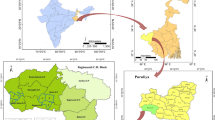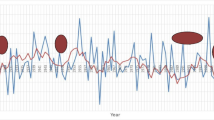Abstract
This article explores the various strategies rural households employ to sustain wetland use and conservation in the context of the restrictions imposed by the existing legal framework in Zimbabwe. Wetland cultivation is a common feature of the rural landscape and is mainly triggered by subsistence households endeavouring to stabilize their food security, especially in semi-arid and arid environments of the developing countries. Data was collected through a household questionnaire survey, key informant interviews, document review and direct observations. Quantitative data was analysed using ANOVA, Spearman Correlation Coefficient and Wilcoxon in Statistical Package for Social Scientists, whereas qualitative data was subjected to thematic analysis. The results revealed that most households adjacent to wetlands were food secure as wetland conditions enable the provision of a wide range of crops and natural products, contributing almost half of the food directly consumed and 48.2 % of average annual household total cash income. It was also observed that various soil and water conservation practices were adopted and local institutional arrangements were put in place to oversee their effective implementation. Thus, the general result has been increased wetland productivity, improved livelihoods and ecosystem protection. This has largely rendered the impact of legislation restricting wetland cultivation subtle in the local context. The study concluded that there is a need to promote participatory wetland management based on low-cost approaches sensitive to local conditions and the needs and practices of the local communities.


Similar content being viewed by others
References
AGRITEX. (2010). Agricultural food security brief: March 2010, Zimbabwe. Harare: Government Printers.
Braun, V., & Clarke, V. (2006). Using thematic analysis in psychology. Qualitative Research Psychology, 3(2), 77–101.
Chifamba, E. (2013). Livelihood resilience through utilization of wetland patches in dry areas of Buhera North, Zimbabwe. Wudpecker Journal of Agricultural Research, 2(11), 303–314.
Dettori, J. (2010). The random allocation process: Two things you need to know. Evidence Based Spine Care Journal, 1(3), 7–9.
Dixon, A. B. (2005). Wetland sustainability and the evolution of indigenous knowledge in Ethiopia. Geographical Journal, 171(4), 306–323.
Ellery, W. N., Grenfell, M., Grenfell, S., Kotze, D. C., McCarthy, T. S., Tooth, S., et al. (2009). WET-origins: Controls on the distribution and dynamics of wetlands in South Africa. Pretoria: Water Research Commission.
FAO. (2006). Fertilizer use by crop in Zimbabwe. Rome: FAO.
FAO, Ifad, & WFP. (2014). The state of food insecurity in the World 2014: Strengthening the enabling environment for food security and nutrition. Rome: FAO.
FEWSNET. (2014). Zimbabwe food security outlook: July–December 2014. http://reliefweb.int/sites/reliefweb.int/files/resources/Zimbabwe_FSO_07_2014_0.pdf. Accessed January 22, 2015.
Finlayson, C. M., & Rea, N. (1999). Reasons for the loss and degradation of Australian wetlands. Wetlands Ecology and Management, 7(1), 1–11.
Galbraith, H., Amerasinghe, P., & Huber-Lee, A. (2005). The effects of agricultural irrigation on wetland ecosystems in developing countries: A literature review. Colombo: Comprehensive Assessment Secretariat.
Gambiza, J., & Nyama, C. (2000). Country pasture/forage resource profiles: Zimbabwe. http://www.fao.org/ag/agp/AGPC/doc/Counprof/zimbabwe/zimbab.htm. Accessed July 16, 2015.
Gumbo, D. (2006). Zimbabwe: Country case study on domestic policy frameworks for adaptation in the Water Sector. http://www.oecd.org/env/cc/36318866.pdf. Accessed October 25, 2014.
Hassan, H. K., & Pantaleo, M. K. T. (2009). Contribution of wetlands to household income and food security in the Nyumba Ya Mungu wetland system, northern Tanzania. Tanzania Journal of Forestry and Nature Conservation, 79(2), 99–108.
Hove, C., & Chapungu, L. (2013). Human perceptions on degradation of wetland ecosystems: The case of Magwenzi Wetland in Chivi District; Zimbabwe. Greener Journal of Geology and Earth Sciences, 1(1), 013–022.
International Water Management Institute (IWMI). (2014). Wetlands and people. Colombo: International Water Management Institute (IWMI).
Kaphengst, T. (2014). Towards a definition of global sustainable land use? A discussion on theory, concepts and implications for governance. In Discussion paper produced within the research project “GLOBALANDS—Global Land Use and Sustainability”. http://www.ecologic.eu/globalands/about. Accessed on January 12, 2016.
Klaus, M. (2005). Sustainable land management: A new approach for implementation. From Pharaohs to Geoinformatics, FIG Working Week 2005 and GSDI-8 Cairo, Egypt.
Kotze, D. (2010). WET-Sustainable use: A system for assessing the sustainability of wetland use. Pretoria: Water Research Commission.
Lange, A., Siebert, R., & Barkmann, T. (2015). Sustainability in land management: An analysis of stakeholder perceptions in rural northern Germany. Sustainability, 7(1), 683–704.
Liniger, H. P., Studer, M. R., Hauert, C., & Gurtner, M. (2011). Sustainable land management in practice—Guidelines and best practices for Sub-Saharan Africa. Rome: TerrAfrica, WOCAT and FAO.
Mabeza, C. M., & Mawere, M. (2012). Dambo cultivation in Zimbabwe: Challenges faced by small-scale dambo farming communities in Seke-Chitungwiza communal area. Journal of Sustainable Development in Africa, 14(5), 39–53.
Madebwe, V., & Madebwe, C. (2005). An exploratory analysis of the social, economic and environmental impacts on wetlands: The case of Shurugwi District, Midlands Province, Zimbabwe. Journal of Applied Science Research, 1, 228-233.
Maglinao, A. R. (2000). Indicators of sustainable land management for slopeland farms. Extension Bulletin, 484(1), 11–17.
Marambanyika, T., Mutsiwegota, C., & Muringaniza, K. C. R. (2012). Importance of community participation in sustainable utilization of Wetlands: Case of Chebvute in Zvishavane District of Zimbabwe. Journal of Environmental Science and Engineering B, 1(7), 832–844.
Marambanyika, T., Beckedahl, H., Njoya, N. S., & Dube, T. (Unpublished). Assessing the environmental sustainability of cultivation systems in wetlands using the WET-Health framework in Zimbabwe.
Mazvimavi, D. (2010). Investigating changes over time of annual rainfall in Zimbabwe. Hydrology and Earth System Sciences, 14(12), 2671–2679.
Ministry of Finance and Economic Development. (2014). The 2015 national budget statement: Towards an empowered society and inclusive economic growth. Harare: Government of Zimbabwe.
Mugandani, R., Wuta, M., Makarau, A., & Chipindu, B. (2012). Re-classification of agro-ecological regions of Zimbabwe in conformity with climate variability and change. African Crop Science Journal, 2(20), 361–369.
Nabahungu, N. L., & Visser, S. M. (2011). Farmers’ knowledge and perception of agricultural wetland management in Rwanda. Land Degradation and Development, 24(4), 363–374.
Ndiweni, N. J., & Gwate, O. (2014). Public perceptions of climate variability risks on wetland management: A Case of Ward 15 of Matobo North District, Zimbabwe. Asian Journal of Social Sciences and Humanities, 3(1), 28–38.
Ngorima, G. T. (2006). Towards sustainable use of Marula (Sclerocarya birrea) in the Savannah woodlands of Zvishavane District, Zimbabwe, Dissertation. University of the Witwatersrand.
Purvis, M., & Grainger, A. (Eds.). (2004). Exploring sustainable development: Geographical perspectives. London: Earthscan.
Rebelo, L. M., McCartney, M. P., & Finlayson, C. M. (2010). Wetlands of Sub-Saharan Africa: Distribution and contribution of agriculture to livelihoods. Wetlands Ecology and Management, 18(5), 557–572.
Russi, D., ten Brink, P., Farmer, A., Badura, T., Coates, D., Förster, J., et al. (2013). The economics of ecosystems and biodiversity for water and wetlands. London: IEEP.
Sakané, N., Becker, M., Langensiepen, M., & van Wijk, M. T. (2013). Typology of smallholder production systems in small East-African Wetlands. Wetlands, 33(1), 101–116.
Sikwila, M. N. (2013). Dollarization and the Zimbabwe’s Economy. Journal of Economics and Behavioural Studies, 5(6), 398–405.
Smyth, A. J., & Dumanski, J. (1993). FESLM: An international framework for evaluating sustainable land management. Rome: FAO.
Turyahabwe, N., Kakuru, W., Tweheyo, M., & Tumusiime, D. M. (2013a). Contribution of wetland resources to household food security in Uganda. Agriculture and Food Security, 2(5), 2–12.
Turyahabwe, N., Tumusiime, D. M., Kakuru, W., & Barasa, B. (2013b). Wetland use/cover changes and local perceptions in Uganda. Sustainable Agriculture Research, 2(4), 95–105.
van Dam, A. A., Kipkemboi, J., Rahman, M. M., & Gettel, G. M. (2013). Linking hydrology, ecosystem function, and livelihood outcomes in African papyrus wetlands using a Bayesian Network model. Wetlands, 33(3), 381–397.
Verhoeven, J. T. A., & Setter, T. L. (2010). Agricultural use of wetlands: Opportunities and limitations. Annals of Botany, 105(1), 155–163.
Vincent, V., & Thomas, R. G. (1960). An agro-ecological survey of Southern Rhodesia Part 1. Salisbury: Government Printers.
Wang, Y., Cheng, S., Ju, H., Zhang, H., Jiang, D., & Zhuang, D. (2011) Evaluating sustainability of wetland system: A case study in East Dongting Lake Area, China. African Journal of Agricultural Research, 6(27), 6167–6176.
Wood, A., Hailu, A., Abbot, P., & Dixon, A. (2002) Sustainable management of wetlands in Ethiopia: Local knowledge versus government policy. In M. Gawler, (Ed.), Strategies for wise use of wetlands: Best practices in participatory management. Proceedings of a Workshop held at the 2nd International Conference on Wetlands and Development (pp. 81–87). Dakar, Senegal.
World Bank. (2008). Sustainable land management sourcebook. Washington DC: The International Bank for Reconstruction and Development/The World Bank.
World Food Summit. (1996). Rome declaration on world food security and world food summit plan of action. http://www.fao.org/ag/againfo/programmes/en/lead/toolbox/indust/romedec.pdf. Accessed January 26, 2015.
ZIMSTAT. (2012). Census 2012 preliminary report. Harare: Zimstat.
ZIMSTAT. (2015). The Zimbabwe poverty atlas. Harare: UNICEF Zimbabwe, World Bank and ZIMSTAT.
Zinhiva, H., Chikodzi, D., Mutowo, G., Ndlovu, S., & Mazambara, P. (2014). The Implications for loss and degradation of wetland ecosystems on sustainable rural livelihoods: Case of Chingombe community, Zimbabwe. Greener Journal of Environmental Management and Public Safety, 3(2), 043–052.
Acknowledgments
The authors are grateful for research funds provided by Midlands State University, Zimbabwe. We would like to thank Lovemore Mhuri for assisting in data collection, Mr. Kudakwashe Muringaniza for generating study area map and Dr. Terence Musanga for assisting with English editing. We would like to thank anonymous reviewers for helping to improve the quality of this manuscript.
Author information
Authors and Affiliations
Corresponding author
Ethics declarations
This work was funded by Research Board, Midlands State University, Zimbabwe. Informed consent of all participants in interviews and questionnaire survey was sought before each person’s participation. Ethical clearance for the research was granted by the Research Ethics Committee, University of KwaZulu Natal (Reference: HSS/0735/014D).
Appendix
Rights and permissions
About this article
Cite this article
Marambanyika, T., Beckedahl, H. & Ngetar, N.S. Community strategies to promote sustainable wetland-based food security in rural areas of Zimbabwe. GeoJournal 82, 987–1003 (2017). https://doi.org/10.1007/s10708-016-9724-0
Published:
Issue Date:
DOI: https://doi.org/10.1007/s10708-016-9724-0




